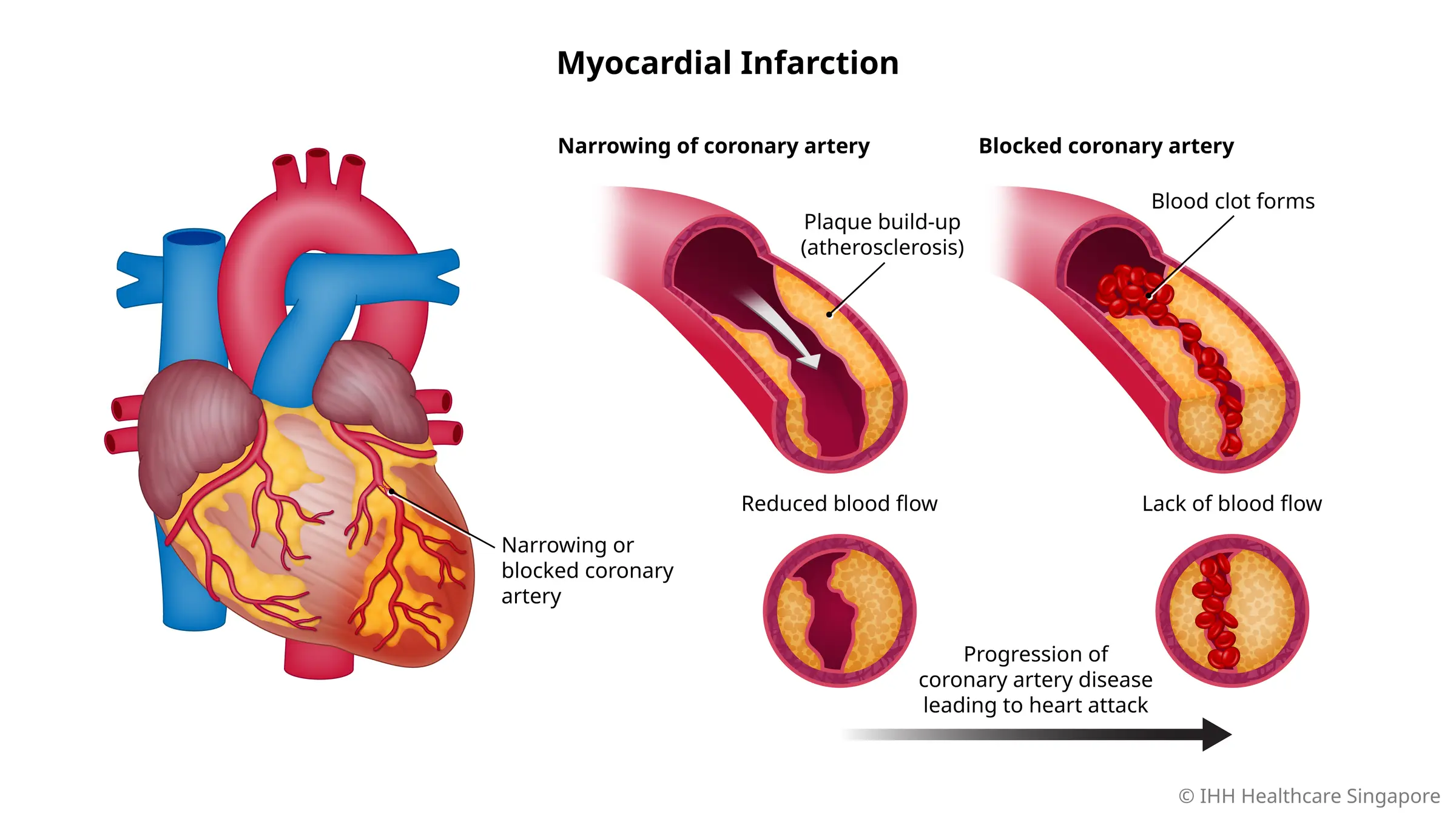
Myocardial Infarction
What is myocardial infarction?
A myocardial infarction, the medical term for a heart attack, occurs when the blood flow to the heart is reduced or blocked. A blockage happens when fatty deposits build up in the walls of the arteries supplying blood to the heart, resulting in a poor oxygen supply to the heart muscle. If the blood flow is not restored promptly, the affected heart tissue dies.
Some patients experience chest pains when a heart attack occurs, but others present no symptoms at all. It is crucial to recognise the warning signs of a heart attack because it can largely be prevented.
Myocardial infarction is the number 2 leading cause of death in Singapore after cancer and is the leading cause of death in some parts of the world.
What are the symptoms of myocardial infarction?
Common warning signs of a heart attack include:
- Chills or cold sweat
- Chest discomfort or pain that feels like pressure, squeezing or clenching, or fullness
- Feeling dizzy or light-headed
- Nausea or vomiting
- Pain or discomfort in the chest or upper body that may spread to the jaw or arms
- Prolonged and severe central chest pain (heavy and crushing sensation)
- Shortness of breath, which may occur on its own or with chest pain
While chest discomfort or pain is the most common symptom, women are more likely to experience shortness of breath, nausea, vomiting, and back or jaw pain.
What causes myocardial infarction?
The most common cause of a heart attack is the narrowing of one or more of the arteries that supply blood to the heart. This results from the build-up of cholesterol deposits in the wall of arteries (a process known as atherosclerosis). This restricts blood flow to the heart muscle and compromises the supply of oxygen.
A partial or complete blockage of the heart’s arteries may then arise, and a sudden and severe blockage can lead to a heart attack.
What are the risk factors for myocardial infarction?
There are modifiable and non-modifiable risk factors associated with a heart attack.
Modifiable risk factors include:
- Cigarette smoking. Smoking and exposure to second-hand smoke damages the inner walls of the arteries, allowing plaque to accumulate.
- Obesity. A sedentary lifestyle or a lack of physical exercise contributes to obesity and high cholesterol levels.
- Chronic conditions such as:
- High blood pressure, which causes the heart to work harder and the heart muscles to thicken and harden. This accelerates the process of atherosclerosis.
- High cholesterol, which is a major component of plaque.
- Diabetes, which is linked to an increased risk of heart attack and other heart problems, especially if blood sugar levels are poorly controlled.
Non-modifiable risk factors include:
- Age. Men aged 45 or older and women aged 55 or older are more likely to have a heart attack than younger adults.
- Strong family history of the disease. If one of your immediate family members, such as a parent or sibling, has had a heart attack, or was diagnosed with heart disease before the age of 60, this may indicate a family history of premature heart disease. This means that your chances of developing heart disease may be higher than the normal population.
- Ethnicity. African Americans, Hispanics, Latinos and Southeast Asians are ethnic groups with an increased risk of CAD morbidity and mortality.
- Gender. Men are 3 – 5 times more prone to having a heart attack than women.
- Menopause. Loss of natural oestrogen increases a woman’s risk of heart disease.
If you have any of the risk factors, it is important to go for regular heart screening with a specialist to ensure a healthy heart. Talk to your cardiologist to find out more.
What are the complications and related diseases of myocardial infarction?
A heart attack is a serious event with long-lasting consequences and complications. Potential complications from a heart attack can vary widely, from mild to life threatening.
These complications include:
Arrhythmia
An arrhythmia occurs when an abnormal heart beats either too fast, too slow or irregularly. This affects the flow of blood and oxygen to the heart and can lead to palpitations, chest pain, dizziness, fatigue or breathlessness.
Heart failure
Heart failure happens when the heart is unable to pump blood effectively to the rest of the body. It can lead to breathlessness, fatigue and build-up of fluid in the arms and legs (oedema).
Heart rupture or cardiac rupture
Heart rupture or cardiac rupture is a rare complication following a heart attack where the damage or trauma caused by a prior heart attack has created a weakened area that can lead to a tear or rupture.
Cardiogenic shock
Cardiogenic shock is similar to a heart failure but in a more severe form. Symptoms can include mental confusion, cold hands and feet, rapid heartbeat, pale skin and difficulty breathing.
This coverage checker is brought to you by Health Insured, an online resource that helps you understand your health coverage in Singapore.
This page has been reviewed by our medical content reviewers.
Need help?
For enquiries, please call
+65 6250 0000 (Orchard) or +65 6898 6898 (Novena)
For appointment bookings, please WhatsApp
+65 8111 7777 (Orchard) or +65 8111 5777 (Novena)
 Brain & Spine Care
Brain & Spine Care








